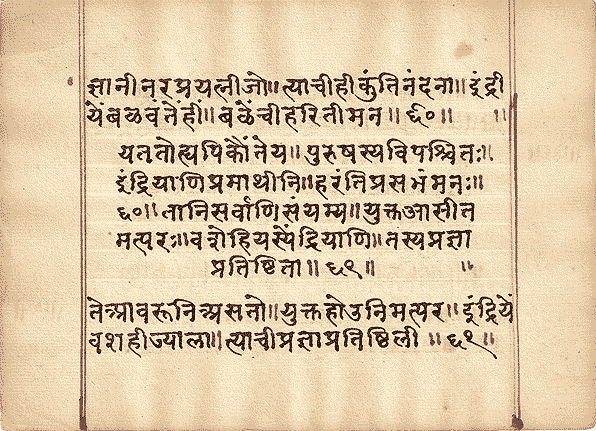BhG 2.60
yatato hy api kaunteya puruṣasya vipaścitaḥ
indriyāṇi pramāthīni haranti prasabhaṃ manaḥ
To play the media you will need to either update your browser to a recent version or update your Flash plugin.
syntax
he kaunteya (O son of Kuntī!),
yatataḥ hi (surely of one who is endeavouring) vipaścitaḥ api (even of the learned) puruṣasya (of a person) pramāthīni (tormenting) indriyāṇi (the senses) prasabhaṁ (forcibly) manaḥ (the mind) haranti (they carry away).
grammar
| yatataḥ | – | yatant (√yat – to endeavour) PPr 6n.1 m. – of one who is endeavouring, who is striving; |
| hi | – | av. – because, just, indeed, surely; |
| api | – | av. – although, moreover, besides, even; |
| kaunteya | – | kaunteya 8n.1 m. – O son Kunti (from: kunti – the people of Kunti, kuntī – Kuntī, mother of the sons of Pāṇḍu); |
| puruṣasya | – | puruṣa 6n.1 m. – of a person (from: √pur – to precede, to lead or √pṝ – to fill, to nourish, puru – abundance, pūru – people); |
| vipaścitaḥ | – | vipaś-cit 6n.1 m. – of the wise, learned (from: vip – excited, inspired, or vi-√paś – to see in detail, to perceive, to know; √cit – to perceive, to think, cit – piled up or cit – thought, heart); |
| indriyāṇi | – | indriya 1n.3 n. – the senses (from: √ind – to be powerful); |
| pramāthīni | – | pra-māthin 1n.3 n. – tormenting (from: pra-√math – to stir, to drag away, to torment); |
| haranti | – | √hṛ (to carry away) Praes. P 1v.3 – they carry away; |
| prasabham | – | av. – forcibly, violently; |
| manaḥ | – | manas 2n.1 n. – the mind (from: √man – to think); |
textual variants
yatato hy api → yattasyapi hi / yatatopi hi / yatayo hyapi (indeed even of one who is endeavouring);
puruṣasya → narasya tu (but of a person);
puruṣasya vipaścitaḥ → puruṣasyāvipaścitaḥ (of a person who lacks thought);
Śāṃkara
The key:
an excerpt from the commented verse
quotes from the scriptures
starting polemic
|
Unrestrained senses work mischief. |
samyag-darśana-lakṣaṇa-prajñā-sthairyaṃ cikīrṣatā ādau indriyāṇi sva-vaśe sthāpayitavyāni, yasmāt tad-anavasthāpane doṣam āha – | |
|
The dangerous senses, O son of Kunti, forcibly carry away the mind of a wise man, |
yatato hy api kaunteya puruṣasya vipaścitaḥ | indriyāṇi pramāthīni haranti prasabhaṃ manaḥ ||2.60|| |
|
|
The senses are dangerous. They agitate the mind of the man who is inclined to sensuous objects. Having thus agitated the mind, they carry it away by force, while the man is wide awake though the mind is possessed of discriminative knowledge. |
yatataḥ prayatnaṃ kurvato ‘pi hi yasmāt kaunteya puruṣasya vipaścitaḥ medhāvino ’pi iti vyavahitena saṃbandhaḥ | indriyāṇi pramāthīni pramathana-śīlāni viṣayābhimukhaṃ hi puruṣaṃ vikṣobhayanti ākulīkurvanti, ākulīkṛtya ca haranti prasabhaṃ prasahya prakāśam eva paśyato viveka-vijñāna-yuktaṃ manaḥ ||2.60|| |
Rāmānuja
ātma-darśanena vinā viṣaya-rāgo na nivartate, anivṛtte viṣaya-rāge vipaścito yatamānasyāpi puruṣasya indriyāṇi pramāthīni balavanti manaḥ prasahya haranti | evam indriya-jaya ātma-darśanādhīna ātma-darśanam indriya-jayādhīnam iti jñāna-niṣṭhā duṣprāpā
Śrīdhara
indriya-saṃyamaṃ vinā sthita-prajñatā na sambhavati | ataḥ sādhakāvasthāyāṃ tatra mahān prayatnaḥ kartavya ity āha yatato hy apīti dvābhyām | yatato mokṣārthaṃ prayatamānasya | vipaścito vivekino ‚pi | mana indriyāṇi prasabhaṃ balād haranti | yataḥ pramāthīni pramathana-śīlāni kṣobhakānīty arthaḥ
Madhusūdana
tatra prajñā-sthairye bāhyendriya-nigraho mano-nigrahaś cāsādhāraṇaṃ kāraṇaṃ tad-ubhayābhāve prajñā-nāśa-darśanād iti vaktuṃ bāhyendriya-nigrahābhāve prathamaṃ doṣam āha yatata iti | he kaunteya !
yatato bhūyo bhūyo viṣaya-doṣa-darśanātmakaṃ yatnaṃ kurvato ‚pi, cakṣiṅo ṅitva-karaṇād anudātteto ‚nāvaśyakam ātmanepadam iti jñāpanāt parasmaipadam aviruddham | vipaścito ‚tyanta-vivekino ‚pi puruṣasya manaḥ kṣaṇa-mātraṃ nirvikāraṃ kṛtam apīndriyāṇi haranti vikāraṃ prāpayanti |
nanu virodhinī viveke sati kuto vikāra-prāptis tatrāha pramāthīni pramathana-śīlāni atibalīyastvād vivekopamardana-kṣamāṇi | ataḥ prasabhaṃ prasahya balātkāreṇa paśyaty eva vipaściti svāmini viveke ca rakṣake sati sarva-pramāthītvād evendriyāṇi vivekaja-prajñāyāṃ praviṣṭaṃ manas tataḥ pracyāvya sva-viṣayāviṣṭatvena harantīty arthaḥ | hi-śabdaḥ prasiddhiṃ dyotayati | prasiddho hy ayam artho loke yathā pramāthino dasyavaḥ prasabham eva dhaninaṃ dhana-rakṣakaṃ cābhibhūya tayoḥ paśyator eva dhanaṃ haranti tathendriyāṇy api viṣaya-sannidhāne mano harantīti
Viśvanātha
sādhakāvasthāyāṃ tu yatna eva mahān, na tv indriyāṇi parāvartayituṃ sarvathā śaktir ity āha yatata iti | pramāthīni pramathana-śīlāni kṣobhakānīty arthaḥ
Baladeva
athāsyā jñāna-niṣṭhayā daurlabhyam āha yatato hīti | vipaścito viṣayātma-svarūpa-vivekajñasya tata indriya-jaye prayatamānasyāpi puruṣasya indriyāṇi śrotrādīni kartṝṇi manaḥ parasabhaṃ balād iva haranti | hṛtvā viṣaya-pravaṇaṃ kurvantīty arthaḥ | nanu virodhini viveka-jñāne sthite kathaṃ haranti tatrāha pramāthīnīti ati-baliṣṭhatvāt taj-jñānopamardana-kṣamāṇīty arthaḥ | tasmāt caurebhyo mahā-nidher ivendriyebhyo jñāna-niṣṭhāyāḥ saṃrakṣaṇaṃ sthita-prajñasyāsanam iti
- Copyright © 2010-2013 Quo Vadis Vision. Wszelkie prawa zastrzeżone.
- |
- About the project
- Appendices
- Audio
- Forum
- Contact

